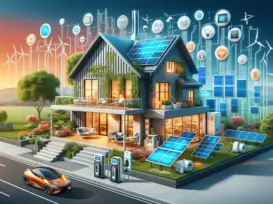Grus Home Energy - Energy Consumption Analysis
Comprehensive Insights into Global Energy Consumption Trends and Efficiency Measures
Comprehensive Insights into Global Energy Consumption Trends and Efficiency Measures
In the face of rapidly evolving technology, socio-economic shifts, and environmental challenges, analyzing energy consumption has never been more important. The global demand for energy continues to rise, influenced by population growth, industrialization, and the digital revolution. However, this increase in energy needs comes with significant environmental costs, necessitating a thorough analysis of energy consumption to identify trends, inefficiencies, and potential areas for improvement.
One of the most prominent trends in energy consumption is the shift towards renewable energy sources. As concerns over climate change intensify, there is a concerted effort worldwide to reduce reliance on fossil fuels. Solar, wind, hydro, and geothermal sources are seeing increased investment and usage. However, the variability of these energy sources and integration into existing grids present challenges that need careful management.
Industrial sectors across the globe consume a significant portion of energy, with manufacturing, transport, and residential heating being some of the largest consumers. Energy efficiency measures in these areas have the potential to lead to substantial reductions in overall energy use. For instance, the implementation of more efficient machinery, the adoption of electric vehicles, and better-insulated buildings can contribute to lower energy consumption while maintaining or even increasing productivity.
The analysis of energy consumption must also consider the impact of technology. The proliferation of digital devices, data centers, and the Internet of Things (IoT) is a double-edged sword. While these technologies can lead to smarter energy use through automation and optimization, they also increase the baseline energy demand. It is crucial to develop energy-efficient technologies and encourage consumer behavior that prioritizes energy conservation.
Another aspect of energy consumption analysis is the disparity in energy use across different regions. Developed countries typically have higher per capita energy consumption compared to developing nations. This inequality poses moral and logistical challenges, as developing countries aspire to improve their living standards, which will likely result in increased energy demand. A balanced approach that enables development while embracing energy efficiency is necessary to manage this dynamic.
Furthermore, policies and regulations play a pivotal role in shaping energy consumption patterns. Governments around the world are introducing measures such as carbon pricing, energy taxes, and subsidies for renewable energy projects to steer consumption towards more sustainable practices. The effectiveness of these policies relies on careful design and enforcement, as well as the willingness of businesses and consumers to adapt to new norms.
To reduce the carbon footprint associated with energy use, there has also been a focus on carbon capture and storage (CCS) technologies. While these technologies can mitigate the impact of fossil fuel use, they are not a panacea. Energy analysis must therefore be holistic, considering not only the immediate effects of energy consumption but also the long-term sustainability of various energy solutions.
In summary, energy consumption analysis is a complex field that encompasses a variety of factors, including technological advancements, economic development, policy implications, and environmental considerations. It is through this comprehensive analysis that governments, businesses, and individuals can make informed decisions to optimize energy use, contribute to a more sustainable future, and address the growing energy needs of our planet.
Blog, Smart Home Automation , February 17, 2024 , Electric Vehicle (EV) Charging, Energy Consumption Analysis, Energy Management, Energy Savings and Profit, Heat Pumps Optimization, Home Battery Storage, Renewable Energy Technologies, Smart Grid Technology, Smart Metering, Smart Metering Systems, Solar Panels Efficiency, Sustainability in Home Energy
©2025 All Rights Reserved. Grus IoT Co.,Ltd.
